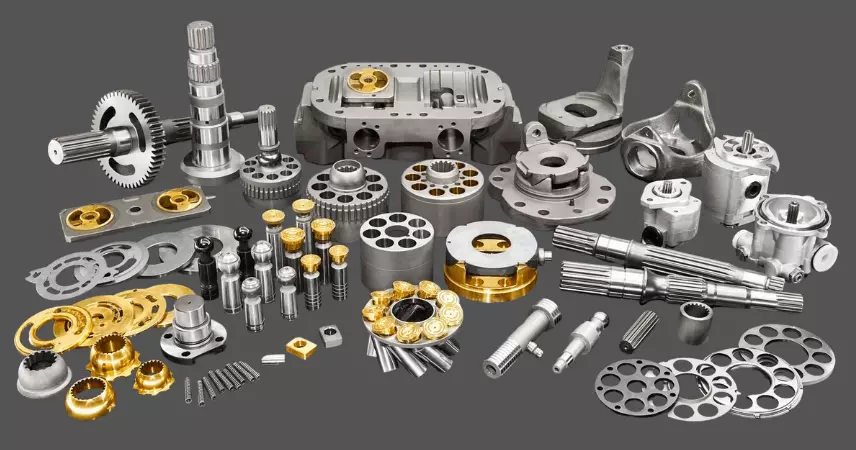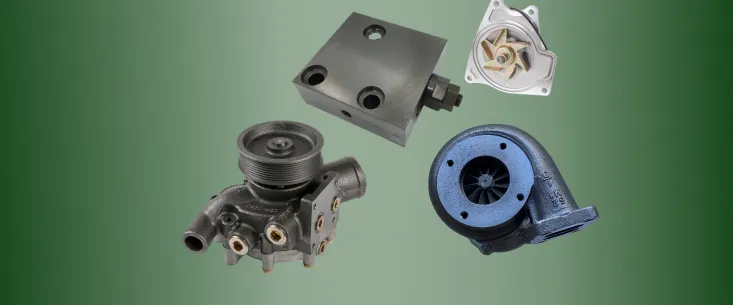+86-135 3388 0668

Hydraulic water pumps are essential components in various industries, from agriculture to construction and beyond. Their efficient performance, durability, and versatility make them invaluable tools for moving water in different applications. This article delves into the workings, advantages, and applications of hydraulic water pumps, exploring their impact on modern industries and the reasons behind their widespread use.
Introduction to Hydraulic Water Pumps and Their Working Mechanism
In the world of engineering, few tools are as versatile and reliable as the hydraulic water pump. These devices have been around for decades, but their importance has grown significantly with advancements in hydraulic technology and an increasing need for efficient water transportation in various industries. Whether it's agriculture, construction, or manufacturing, Hydraulic pumps have become the cornerstone for managing water resources with precision, speed, and efficiency.
What is a Hydraulic Water Pump?

A hydraulic water pump is a device used to move water or other fluids through a system by converting mechanical energy into hydraulic energy. It does this by using the force generated by pressurized fluid to create a steady flow of water. Unlike traditional pumps, hydraulic pumps rely on hydraulic power, which is generated by a pump driven by a motor that uses oil or another pressurized fluid as a medium. This fluid is used to exert force on the water, moving it through pipes and hoses to where it is needed.
The main appeal of hydraulic pumps lies in their ability to generate substantial pressure and deliver high flow rates, all while using relatively low amounts of energy. This makes them ideal for a wide variety of applications where moving large quantities of water or fluid quickly is necessary. Furthermore, hydraulic pumps can be used to manage the water in systems that involve both high pressures and high flow rates, which can be challenging for other types of pumps.
The Working Mechanism of Hydraulic Water Pumps
At its core, the hydraulic water pump operates on a simple principle: the conversion of mechanical energy into hydraulic energy. The pump consists of several key components, each playing a crucial role in its operation:
Pump Housing: This is the outer casing that contains all the working parts of the pump. It is usually made of strong, durable materials that can withstand high pressures and wear over time.
Impeller or Gear Set: The impeller or gears inside the pump are responsible for transferring energy to the fluid. In centrifugal hydraulic pumps, an impeller spins to create a centrifugal force that moves the water. In Gear pumps, two intermeshing gears create pressure as they turn.
Pump Shaft: The pump shaft is connected to a motor that provides the rotational power needed to drive the impeller or gears.
Inlet and Outlet Ports: These are the pathways through which water enters and exits the pump. The inlet port is connected to a water source, while the outlet port directs the pumped water to its destination.
Seals and Bearings: These parts help maintain the integrity of the pump, ensuring that the water does not leak and that the moving parts operate smoothly.
When the hydraulic pump is activated, the motor drives the impeller or gears, which creates a pressure difference within the pump. This pressure difference causes water to be sucked into the pump through the inlet port and forced out through the outlet port, thereby achieving the desired flow.
Advantages of Hydraulic Water Pumps
High Efficiency: Hydraulic pumps are known for their ability to handle large amounts of water with minimal energy usage. This makes them highly efficient, particularly in large-scale industrial applications.
Durability and Longevity: With their heavy-duty design, hydraulic water pumps are built to last. They are made of high-quality materials that resist wear and tear, ensuring a long operational life even in harsh environments.
Versatility: Hydraulic pumps can be used in a wide range of applications, from irrigation systems in agriculture to flood control in urban areas. Their ability to operate under various pressure and flow conditions makes them incredibly versatile.
Low Maintenance: Compared to other types of pumps, hydraulic water pumps require less maintenance. Their simple, robust design minimizes the risk of breakdowns, and they often come with self-lubricating systems that reduce the need for frequent servicing.
Energy Efficiency: Hydraulic systems are highly energy-efficient because they use pressurized fluid, which allows for the transfer of energy without much loss. This is particularly advantageous in industrial settings where energy costs can be a significant concern.
Applications, Benefits, and Future Trends in Hydraulic Water Pump Technology
Hydraulic water pumps are used across a broad spectrum of industries, thanks to their remarkable efficiency and reliability. From agriculture to urban development and beyond, these pumps play an essential role in moving water and managing fluid systems. Let’s take a closer look at the various applications and the growing role of these pumps in modern industries.
Applications of Hydraulic Water Pumps
Agriculture: Irrigation Systems
In agriculture, efficient irrigation is critical for maximizing crop yields. Hydraulic water pumps are commonly used in irrigation systems to move water from a source to the fields. These pumps can be designed to handle large volumes of water, providing farmers with a reliable and cost-effective solution for watering crops. Whether used in drip irrigation or flood irrigation systems, hydraulic pumps ensure that water is delivered where it is needed, optimizing the use of water resources.
Construction: Dewatering and Flood Control
In construction, hydraulic water pumps are essential for dewatering sites and managing water in flood-prone areas. When working on construction sites, managing excess water can be a significant challenge, especially during heavy rain. Hydraulic pumps are used to remove water from excavations, foundations, and tunnels, keeping projects on track and preventing delays. They also play a key role in flood control, ensuring that rivers, lakes, and urban areas do not suffer from water overflow.
Industrial Manufacturing: Cooling and Circulation Systems
Many industries rely on hydraulic water pumps to circulate water through cooling systems. Whether it’s for cooling machinery or processing plants, these pumps ensure that water flows smoothly and efficiently throughout the system. Hydraulic pumps can handle the high pressures and flow rates required in these applications, ensuring that the equipment stays cool and operational. This is crucial in industries such as power generation, food processing, and chemical manufacturing.
Water Treatment: Filtration and Purification
Hydraulic water pumps are used extensively in water treatment plants to move water through filtration and purification systems. These pumps are responsible for circulating water through various stages of treatment, such as sedimentation, filtration, and disinfection. Hydraulic pumps ensure that the process is continuous and efficient, providing clean, safe water for communities.
Mining and Oil Extraction
In mining and oil extraction, hydraulic pumps are used for a variety of purposes, including moving slurry, transporting oil, and dewatering mining operations. In these industries, reliability is key, as delays can be costly. Hydraulic water pumps provide the high-performance solutions needed to keep operations running smoothly, ensuring that fluids are moved quickly and safely.
The Benefits of Using Hydraulic Water Pumps
Cost-Effective Operations
The efficiency of hydraulic pumps translates to lower operational costs. Because they require less energy and maintenance compared to other types of pumps, businesses save money on both energy bills and repair costs. This cost-effectiveness makes hydraulic water pumps a smart investment for any industry that relies on water movement.
Environmental Sustainability
As industries face increasing pressure to reduce their environmental impact, hydraulic pumps are becoming a preferred choice due to their energy efficiency. These pumps help reduce the consumption of electricity, which can have a significant positive effect on a company’s carbon footprint. Additionally, because hydraulic pumps can be used in closed-loop systems, they reduce water wastage, contributing to more sustainable water management practices.
Hydraulic pumps are designed to handle high pressures and flow rates with ease. Their ability to operate reliably in demanding conditions makes them ideal for industries that require high safety standards, such as chemical manufacturing and construction. With built-in safety mechanisms and their robust design, hydraulic pumps offer peace of mind for operators.
The Future of Hydraulic Water Pumps
Looking ahead, hydraulic water pumps will continue to play a crucial role in water management and industrial processes. As technology advances, we can expect even more energy-efficient models that integrate with smart systems, allowing for remote monitoring and predictive maintenance. Innovations in materials and design will also enhance the performance and lifespan of these pumps, making them even more reliable and cost-effective.
Furthermore, as global water scarcity becomes a growing concern, the role of hydraulic pumps in water conservation and management will only become more important. Their efficiency, versatility, and reliability make them a key component in ensuring that water is used effectively and sustainably across industries.
In conclusion, hydraulic water pumps are an indispensable tool in the modern world. Their efficiency, durability, and versatility make them an essential part of industries ranging from agriculture to construction and beyond. As technology continues to evolve, the importance of these pumps will only grow, cementing their place as a vital component in ensuring efficient water management and industrial success.
Search
Blog & News